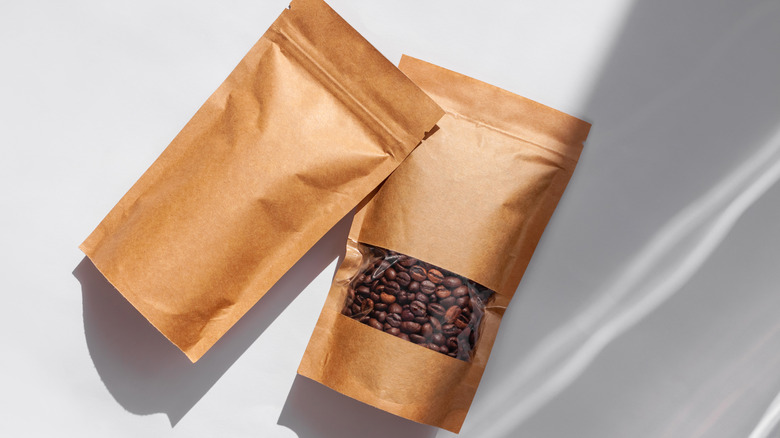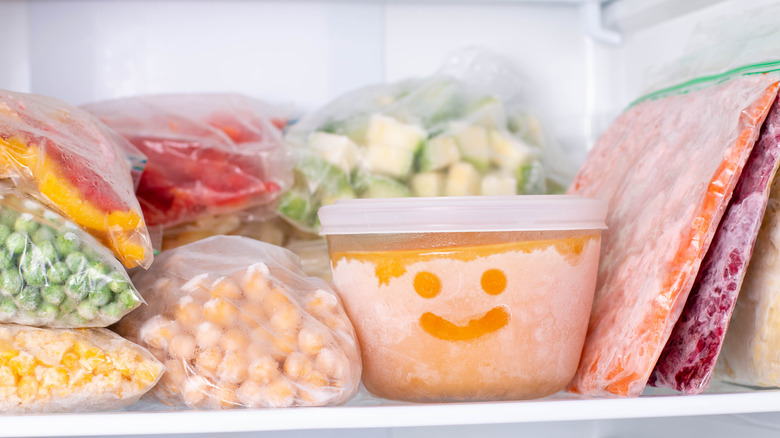The Absolute Best Ways To Keep Coffee Beans Fresh
The joys coffee brings to our mornings (and occasionally our afternoons) can hardly be measured. Who doesn't love waking up to the aroma of percolating joe that's dark, fragrant, and ready to be mixed with our sweeteners and milks of choice? Whether your preferred brew is an espresso, a latte, or plain old drip coffee, having the stuff on hand at home provides a comforting routine and a nice jolt of caffeine first thing in the a.m.
If you regularly prepare coffee at home, you've probably given much thought to how to store coffee beans for maximum freshness and flavor retention. JavaPresse recommends storing whole beans, only grinding them when you are ready to brew coffee because whole beans can better preserve their smooth flavor and rich aroma. If you are wondering how to store whole beans to get the best shelf life, you'll want to try these foolproof hacks.
Store at room temperature in an airtight container
According to the National Coffee Association (NCA), the greatest enemies of coffee beans are air, moisture, heat, and light, each of which breaks down the flavors and aromas of coffee beans in different ways. The NCA recommends storing your beans in an airtight, opaque container that doesn't allow much light to pass through to keep your beans safe from these elements. Room temperature is just right for coffee beans, but the NCA suggests looking for a spot in your kitchen, pantry, or counter that's not too close to your oven or prone to getting strong sunlight.
The packaging your beans come in is not ideal for long-term storage, so investing in a dedicated airtight coffee container is the way to go. When stored this way, whole coffee beans should stay fresh for up to up to nine months but no longer, notes Amora Coffee, as the quality degrades over time.
Store in the original packaging
Many coffee experts recommend transferring whole coffee beans to an airtight container for long-term storage. Some, however, like keeping them in their original packaging, especially if the coffee bag features a one-way valve that lets out gas without letting in oxygen. Gas can accumulate in the coffee over time, but this one-way valve featured in newer coffee bag models prevents it. According to Food52, these bags do a good job of keeping the beans airtight and protected from sunlight.
"The best way to store coffee is to store it in the bag it comes in," Erika Vonie, director of coffee at the coffee subscription service Trade, told the outlet. "Most coffee bags are designed with a gas-release valve on them, which does a great job of letting that gas expel without letting air in." If you choose this method of storage, just be aware that the beans won't stay fresh nearly as long as they will in an airtight container: you should use them within one to two weeks for the best flavor, notes Bon Appétit.
Store coffee beans in the freezer
While the coffee world is divided on whether or not to store beans in the freezer, plenty of experts agree that it can safely add shelf life to your coffee. Erika Vonnie told Bon Appétit that freezer storage is ideal because of its darkness and stable temperature. However, the National Coffee Association suggests that you should transfer them to an airtight container for the best insurance against the moisture, odors, and flavors present in the freezer. Another freezer tip is to avoid defrosting and refreezing them. Doing so creates moisture that ages the coffee. According to Consumer Reports, frozen coffee beans will stay fresh for about one month.
Wondering if you can refrigerate coffee? Wonder no more! A large chunk of the coffee world agrees it's not a good idea. "The fridge is not good at all," Trevor Corlett of Madcap Coffee Company told Bon Appétit. "It causes the coffee to condensate and pushes oils to the surface. It actually ages the coffee faster." So stick to room temperature storage or the freezer in an airtight container or bag, and you'll be enjoying fresh coffee for weeks or months to come.



